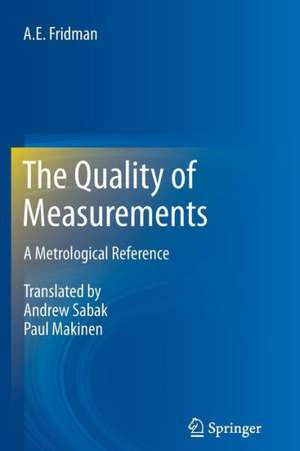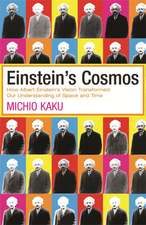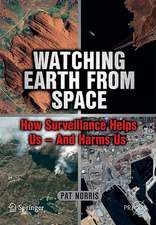The Quality of Measurements: A Metrological Reference
Autor A. E. Fridman Traducere de Andrew Sabak, Paul Makinenen Limba Engleză Paperback – 25 ian 2014
The information about modern systems of traceability is given. All discussed theoretical principles and calculation methods are illustrated with examples.
| Toate formatele și edițiile | Preț | Express |
|---|---|---|
| Paperback (1) | 637.13 lei 6-8 săpt. | |
| Springer – 25 ian 2014 | 637.13 lei 6-8 săpt. | |
| Hardback (1) | 643.34 lei 6-8 săpt. | |
| Springer – 22 noi 2011 | 643.34 lei 6-8 săpt. |
Preț: 637.13 lei
Preț vechi: 749.56 lei
-15% Nou
Puncte Express: 956
Preț estimativ în valută:
121.95€ • 132.51$ • 102.51£
121.95€ • 132.51$ • 102.51£
Carte tipărită la comandă
Livrare economică 21 aprilie-05 mai
Preluare comenzi: 021 569.72.76
Specificații
ISBN-13: 9781489999757
ISBN-10: 1489999752
Pagini: 228
Ilustrații: XIV, 214 p.
Dimensiuni: 155 x 235 x 12 mm
Greutate: 0.33 kg
Ediția:2012
Editura: Springer
Colecția Springer
Locul publicării:New York, NY, United States
ISBN-10: 1489999752
Pagini: 228
Ilustrații: XIV, 214 p.
Dimensiuni: 155 x 235 x 12 mm
Greutate: 0.33 kg
Ediția:2012
Editura: Springer
Colecția Springer
Locul publicării:New York, NY, United States
Public țintă
ResearchCuprins
Preface.- From the Author.- 1. Basic Concepts of Metrology.- 2. Measurement Errors.- 3. Measurement Uncertainty.- 4. Methods for Estimation of Measurement Results and Their Uncertainties.- 5. International System of Units SI.- 6. Measurement Assurance.- 7. Verification and Calibration Intervals.- 8. Assurance of Measurement Accuracy in Correspondence with the ISO 5725 Standards.- References.- Index.
Textul de pe ultima copertă
This book provides a detailed discussion and commentary on the fundamentals of metrology. The fundamentals of metrology, the principles underlying the design of the SI International System of units, the theory of measurement error, a new methodology for estimation of measurement accuracy based on uncertainty, and methods for reduction of measured results and estimation of measurement uncertainty are all discussed from a modern point of view. The concept of uncertainty is shown to be consistent with the classical theory of accuracy. The theory of random measurement errors is supplemented by a very general description based on the generalized normal distribution; systematic instrumental error is described in terms of a methodology for normalizing the metrological characteristics of measuring instruments.
A new international system for assuring uniformity of measurements based on agreements between national metrological institutes is discussed, in addition to the role and procedure for performance of key comparisons between national standards. The conclusion describes a new methodology for assurance of measurement accuracy (based on the provisions contained in the ISO 5725-series standards) that is now becoming more and more common around the world. All of the theoretical statements and calculation methods are illustrated using examples.
This book will be of interest to personnel working in government metrological services (or in the metrological services of legal entities), and to specialists who use measuring instruments or make use of measured data in their daily activities It will be useful to students at technical universities when studying the academic disciplines of Metrology, Standardization, and Certification; Metrology and Measurement Assurance; and Metrology and Measuring Instruments.
A new international system for assuring uniformity of measurements based on agreements between national metrological institutes is discussed, in addition to the role and procedure for performance of key comparisons between national standards. The conclusion describes a new methodology for assurance of measurement accuracy (based on the provisions contained in the ISO 5725-series standards) that is now becoming more and more common around the world. All of the theoretical statements and calculation methods are illustrated using examples.
This book will be of interest to personnel working in government metrological services (or in the metrological services of legal entities), and to specialists who use measuring instruments or make use of measured data in their daily activities It will be useful to students at technical universities when studying the academic disciplines of Metrology, Standardization, and Certification; Metrology and Measurement Assurance; and Metrology and Measuring Instruments.
Caracteristici
The monograph provides an introduction to the modern fundamentals of metrology The presented methodology of measurement accuracy assurance that is based on the ISO 5725 standards helps readers validate new measurement methods Presented methods on the basis of the author theory of metrological reliability of measuring instruments help readers determine the calibration and verification intervals Includes supplementary material: sn.pub/extras








